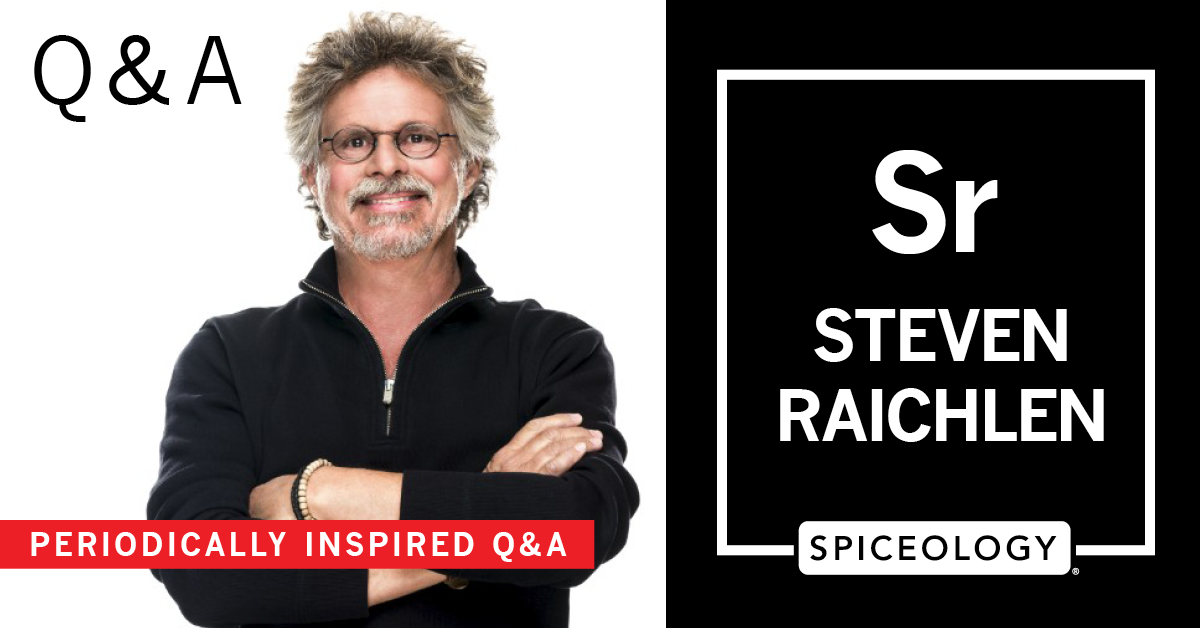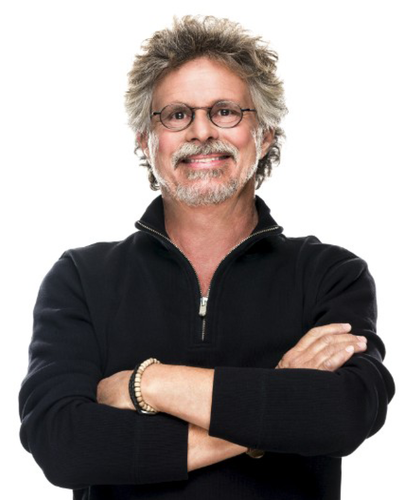
Steven Raichlen is a dude who knows his barbecue.
(File that statement under: biggest understatement ever.)
From the storied halls of La Varenne cooking school in Paris to the gritty and ash-covered open fire pits of North Carolina, Steven has dedicated almost 40 years to his craft, which is why he’s considered the foremost authority on modern barbecue.
In fact, this culinarian has so many accolades that we had to go with bullet points:
- 5x James Beard Award winner
- 3x IACP Julia Child Award winner
- Author of 32 books, including international bestsellers The Barbecue Bible, How to Grill, Planet Barbecue, and more.
- Member of the Barbecue Hall of Fame since 2015 and Inductee into the Taste Hall of Fame
- Food & Wine, The New York Times, National Geographic Traveler, Bon Appetit, and Esquire contributor
- History of barbecue lecturer at Harvard, the Library of Congress, and the Smithsonian Institution
As an unassuming writer, lecturer, and TV host, Steven has created an enormous universe that revolves around the fire. We sat down with him for our Periodically Inspired chefs Q&A series that takes a deep dive into their passions, inspirations, favorite things, and a lot more.
Get to know him below:
What are some of your earliest memories around the grill?
“Well, first of all, unlike most American families, the grill master in my family was my mother, not my father. And, when my mother would light the grill - she would use gasoline. One time she put the match down first and then gasoline, which exploded with flames hitting the side of the house. But there was a neighbor nearby who came and helped. I guess you could say that fire has been part of my experience from a very early age.
My mother would do a Pittsburgh Rare steak; it was basically the black color of coal on the outside with a heart-still-beating rareness on the inside. That was my first intro to steak and open fire grilling.
When I moved into my first apartment in Cambridge, MA, I bought a grill. And, you know, being a human being with a Y-chromosome, I just assumed that I knew how to grill instinctively and automatically.
But in terms of doing it systematically and well and learning how to master the fire - that began with the research for my book, The Barbecue Bible. That book was inspired by an idea rather than any innate expertise. I spent 4years writing that book and learning how to grill.”
Who were some of your mentors on your grilling journey?
“Chris Schlesinger, the author of a book called The Thrill of the Grill. That was really the first serious grill book I owned. I used to be the restaurant critic for Boston Magazine, and that's where I first met Chris while reviewing his restaurant. It was the first live fire restaurant in Boston
Chris - like I - had a classical French training background. He went on an around the world surfing trip and found that none of the food that he had ever learned in the French system was nearly as flavorful as anything say grilled on a beach with scotch bonnet chilis.”
Why did you decide to write your first cookbook and what’s your method?
“I don't like a lot of secondary research. For my college thesis I wrote about a very obscure medieval French poet named Christine de Pizan, and I picked her precisely because there was no secondary literature on her at the time.
The same was true when I started The Barbecue Bible. There really wasn't much in the way of books about barbecuing and grilling, and I really researched and learned in the field.
The first thing I do whenever I write a cookbook is pack a suitcase. For The Barbecue Bible, I visited 25 countries, and then I went out again with Planet Barbecue and visited 71 countries.
There's a peculiar thing that happens to me when I'm abroad and researching. I immerse myself in that world. I remember one time in Penang, Malaysia, leaving my wife in the morning and saying, I'll be back soon.
And the next thing I knew I looked up and it was night. I just spent the whole day at the beach going from stall to stall and watching people grill, tasting their food, taking notes and pictures - that's really where I learned to grill - in the field.”
How did you go about recipe testing your 500+ recipes in The Barbecue Bible?
“The plan was to do maybe 100 recipes and visit maybe 10 countries and bang out the book. It wound up taking four years and I actually wrote three other books to pay for the research because it just became such an enormous project.
My recipe process is probably a little different from others; I tend to write the recipe first, test it and then I have an independent team of testers try it out. It’s always very important to have third-party testers because you can force your recipes to work, it’s just human nature. Whereas to have an independent person test the recipe, they can find all sorts of problems and things you never thought of.”
What made you start Barbecue University?
“After college I went to the Watson Foundation Fellowship a la Tom Watson, IBM founder, and I proposed to study medieval cooking in Europe. That took me to La Varenne cooking school in Paris founded by Anne Willan.
She was part brain and part hands. She was already very pro at the time I met her and was writing a book called Great Chefs and their Recipes. She was a food historian, but at the same time she founded this cooking school.
After attending that school and from that point on I focused on writing and teaching. I moved back to Boston, became a freelance writer and restaurant critic for Boston Magazine and Food & Spirits columnist for GQ Magazine. But all the while, I was also teaching cooking classes in my apartment.
So when I got into barbecue it seemed like a logical extension. I made a list of everything that I could and should do with barbecue, and on that was a long list of barbecue cookbooks, website, TV show, products, and a cooking school.
I was a great believer that if you can conceive it and believe it, you can achieve it; I made this list of everything I wanted to do with barbecue. And over the next couple of years, it all happened. So that's how Barbecue University happened.”
Is there a dish you are best known for?
“The Caveman T-Bone. You cook a very thick T-Bone steak directly on the embers of the fire - no grill. And then it gets topped with a sauce of jalapeños, cilantro and garlic.
I suppose I’m just a frustrated historian and anthropologist at my core; in two of my books - BBQ USA and Planet BBQ - I go into the history of barbecue. I actually start with Homo erectus and the discovery of fire and how it influenced and shaped the course of human evolution, anatomy, sociology, culture, etc. So the caveman part of the Caveman T-Bone rings very true.
It's also just great cinema and theater - eyes pop and jaws drop. A thing I like about barbecue is that so much of it is theatrical and about the spectacle.”
What do you think the future of grilling looks like?
“I think there's going to be a sort of happy schizophrenia about grilling. On the one hand, many of us are going to want to return to the most basic and primal grilling, which is charcoal and wood. On the other hand, grills are going to get more and more connected to your iPhone and more and more smart - so you can digitally dial in temp control, heat monitoring and so on. I think there's a place for both.
When I was growing up, grilling was a special occasion. Now it's how many of us cook four or five nights a week, but it's also remained a special occasion. I think American grilling will continue to become more global, as it has already.
Also, multiple grill ownership will continue, cooking the whole meal on the grill will gain momentum - that’s something I've been espousing for 20 years now.
Grilling is going to become more and more integrated into our culinary experience, world view, and how we conduct our gastronomic lives.”
What is the spice that you consider to be undervalued?
“In the context of barbecue, I'm going to say saffron. But it’s certainly not ‘undervalued’ in the monetary sense - I mean, it's one of the most expensive spices in the world. And in the Middle East and parts of Europe, it's a very prominent barbecue spice, but not so much in America.
It's aromatic, it's perfumed - it plays as much to the nose and the retronasal passages as it does to your actual taste buds. It's also a gorgeous color - meats (cooked with it) have that burnished and sort of orange glow afterwards.”
What advice would you give to someone just starting out in grilling?
“First, buy a book like How to Grill or The Barbecue Bible. Second, sign up for my Up In Smoke newsletter on my website, BarbecueBible.com and pour through the recipes there. Third, tune into public television and watch shows like Planet Barbecue or Project Fire or Project Smoke.
After that - I’d invest in a charcoal grill. Also follow people on social media for inspiration like Derek Wolf on Instagram. The things he’s done with Instagram and sharing over the fire grilling are just amazing.”
Do you use your formal culinary training while grilling, and if so, how?
“Sure thing - first of all, basic techniques I learned in culinary school. How to dice properly, how to bone a chicken or fish properly - all of those mechanical things. You learn that very early on when you're trained in French cuisine and it's super helpful.
Just philosophically speaking, the closest analogy to cooking is language - and what are the components of language? Vocabulary and grammar. The vocabulary is the sounds, words, sentences and phrases. Then grammar is the rules by which you put it all together.
So the food and ingredients are our vocabulary and techniques are our grammar.
I always had that model in my mind when I wrote The Barbecue Bible, and then even more so with How to Grill.
When it comes to grilling, there’s kind of this massive superstition: ‘I grill this way because my daddy does it this way,’ or ‘that’s just how it’s always been done.’ I don't think anybody ever really tried to think of a system with underlying principles and guidelines. Or how each culture might start with similar ingredients or different ingredients, but put them together in their own unique cultural way.
So back to your question - yes, the techniques I learned, but the most important thing was applying an intellectual framework to barbecue.”


